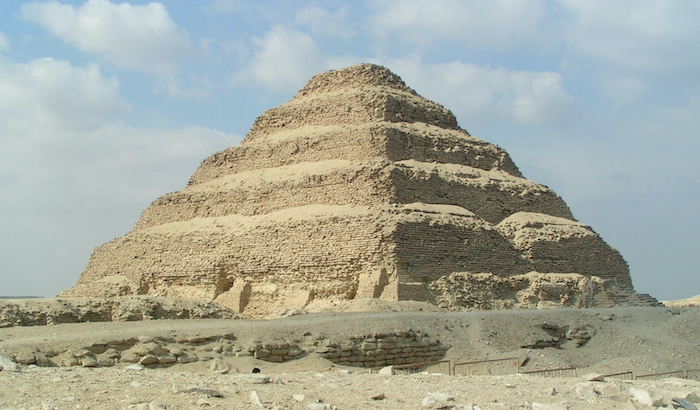Once a month here on the Molten Sulfur Blog, I run content taken from our book Archive: Historical People, Places, and Events for RPGs. This post is one of eighty entries in Archive, each more gameable than the last!
This post is brought to you by beloved Patreon backer Arthur Brown. Thanks for helping keep the lights on! If you want to help keep this blog going alongside Arthur, head over to the Patreon page – and thank you!

Imhotep
Jack of All Trades, Master of All Too
Born sometime between 3000 B.C. and 2700 B.C. to a celebrated architect, Imhotep lived during the reign of the Pharaoh Zoser. These were the early days of Egyptian history, before pyramids and sphinxes marked the landscape. Throughout his life, Imhotep worked in many fields and served as Zoser’s magician, physician, scribe, sage, architect, astronomer, priest, and vizier. Imhotep was so revered that a mere 100 years after his death, his status was elevated to that of a demigod, one of the few individuals not born to royalty to be deified. As time passed, some worshipped him as a full god, often associated with Asclepius, the Greek god of healing and medicine.
Being a vizier under Pharaoh Zoser came with great responsibility, as the vizier in Ancient Egyptian politics was the highest official under the pharaoh, and a vizier was often chosen for his or her loyalty and talent. The most general duties of a vizier were supervising the running of the country, sitting and ruling in the High Court, and supervising the security of the pharaoh and the palace.
Perhaps one of Imhotep’s most famous successes as a vizier and priest was when he ended a seven-year famine. Egyptian farms relied on the Nile River’s usual flood levels to nourish their crops, and when the river’s level remained low for years, Egypt starved. Khnum, the early Egyptian god of the Nile, was apparently punishing Zoser for not paying him proper tribute. The pharaoh was ignorant of this until Imhotep brought it to his attention. Imhotep counseled the pharaoh on how to please the god, suggesting he offer up a sacrifice and a prayer.
In one myth about the famine, it was said Imhotep suggested Zoser build a temple to please Khnum. Imhotep had ideas of the location and the various materials nearby that could be used to build it. Shortly thereafter, Zoser had a dream where Khnum appeared before him and told him how to construct a temple for the gods. To please Khnum, Imhotep and Zoser constructed this temple, and after it was finished, the Nile returned to its usual level.
The temple of this myth is assumed to be the masterpiece that made Imhotep a famous architect, even in the modern age: the world’s first pyramid. It consists of six terraces, creating a 200-foot-tall stairway to the gods. A crumbling wall encloses the area where chapels used to surround the pyramid and its courtyard. Engraved into the limestone walls of the structure were images: scenes of animals, vegetation, and daily life, with some of them retaining their original paint after 4,500 years.
Imhotep was also historically revered as a physician, but there is much debate about whether he was considered a healer before his death, or if his deification made him a curer of all disease. He was supposedly the author of the Edwin Smith Papyrus, an ancient Egyptian medical text that described almost 50 cases of military-related injuries, but scholars still debate the authorship. Regardless of whether he was actually a great physician in his lifetime, Imhotep had a cult who secretly worshipped him between 525 B.C. and 550 A.D. This cult most often worshipped his medical prowess, but they were also believed to dabble in necromancy.
Imhotep in Play
As a mortal who successfully achieved apotheosis, Imhotep could be a great, flexible asset to your campaign. In an ancient setting, Imhotep is a mere mortal, though one of the first documented polymaths. His religious advice could lead your party to an encounter with the gods, or like Zoser, dreams of the gods. With his architectural prowess, he could have a secret hideaway in the desert filled with traps and secret passages. Or maybe only he can cure a disease one of your PCs contracted on their journey. In a more contemporary context, he could be a myth walking in the skin of a mortal, offering astounding medical remedies and cures, possibly of a magical origin. Perhaps your PCs come across a fragile old quest giver looking for aid, unaware he is actually a god, searching for generous mortals or testing their knowledge. Or your PCs could find themselves involved with Imhotep’s cult, who in the light of day seem to only be searching for cures to fend off disease, while in the shadows attempting to reverse the tragedy of death.






